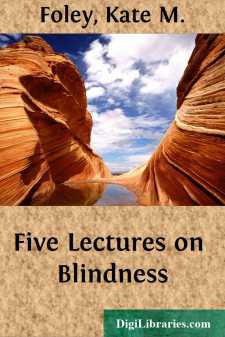Categories
- Antiques & Collectibles 13
- Architecture 36
- Art 48
- Bibles 22
- Biography & Autobiography 813
- Body, Mind & Spirit 142
- Business & Economics 28
- Children's Books 17
- Children's Fiction 14
- Computers 4
- Cooking 94
- Crafts & Hobbies 4
- Drama 346
- Education 46
- Family & Relationships 57
- Fiction 11829
- Games 19
- Gardening 17
- Health & Fitness 34
- History 1377
- House & Home 1
- Humor 147
- Juvenile Fiction 1873
- Juvenile Nonfiction 202
- Language Arts & Disciplines 88
- Law 16
- Literary Collections 686
- Literary Criticism 179
- Mathematics 13
- Medical 41
- Music 40
- Nature 179
- Non-Classifiable 1768
- Performing Arts 7
- Periodicals 1453
- Philosophy 64
- Photography 2
- Poetry 896
- Political Science 203
- Psychology 42
- Reference 154
- Religion 513
- Science 126
- Self-Help 84
- Social Science 81
- Sports & Recreation 34
- Study Aids 3
- Technology & Engineering 59
- Transportation 23
- Travel 463
- True Crime 29
Five Lectures on Blindness
by: Kate M. Foley
Categories:
Description:
Excerpt
FOREWORD.
The following lectures were written primarily to be delivered at the summer sessions of the University of California, at Berkeley and at Los Angeles, in the summer of 1918. We are printing them, however, so that the information in them can be more widely distributed, since they are the outgrowth of almost a quarter of a century spent in work for the blind, and were written from the standpoint of a blind person, seeking to better the condition of the blind. They were addressed not to the blind, but to the seeing public, for the benefit that will accrue to the blind from a better understanding of their problems.
The successful work of Miss Foley as a student in the California School for the Blind, as a volunteer teacher, and in recent years as home teacher for the California State Library, makes these lectures particularly important and authoritative.
Milton J. Ferguson,
State Librarian.
In view of the widespread interest now manifested in the blind and their problems—an interest deepened by reports from the warring countries—I feel that a knowledge of the psychology of blindness should prove of great help to those wishing to take part in the re-education of the war-blinded soldiers.
As early as 1773, Diderot wrote an essay on the psychology of blindness, and, as this essay was written at the very beginning of blind education, it is interesting to note that his ideas coincide with the most advanced deductions on the subject today. However, as these deductions are not very numerous, and as the available literature is very scant, I shall be obliged to draw largely from my own experience and that of other blind persons, in presenting the subject to you.
First, let us consider the subject from the point of view of one who has been blind from early infancy, whose fingers are his eyes, and whose mental vision enables him to see many things not revealed by physical sight. A blind man once said, when asked if he would not be glad to have his eyesight, "to improve the organs I have, would be as good as to give me that which is wanting in me." This sentence sums up the whole aim of blind education. Dr. Eichholtz, a noted educator of the blind, says: "Education of the blind absolutely fails in its object, in so far as it fails to develop the remaining faculties to compensate for the want of sight." "Touch and sight must be developed by means which practically in all respects are dissimilar. A blind man discerns the sensation from the real presence of an object at his fingers' end, only by the force or weakness of that very sensation." So, then, let us consider that, to the blind, fingers are eyes, and remember that they have ten instead of two. As I have been blind since early infancy, my own case offers an illustration in point, so I hope you will not misunderstand the predominance of the personal note in these observations.
Blindness does not lead to any refinement of the senses of touch, hearing or smell, but to a greater keenness in the interpretation of the information furnished by these senses. Diderot says, "the help which our senses reciprocally afford to each other, hinders their improvement," and so the person in possession of all the senses regards the blind man as a marvel of intelligence and skill, just because, on losing his eyesight, his remaining senses come to the rescue, and he continues to live and move and have his being without the most precious of all physical senses. In the world of the blind child eyesight plays no part, and so the other senses are made to do double duty, and the extent to which these may be cultivated is limited only by the mentality of the child, its early training and environment.
I think hearing is the first sense to be cultivated, both in the infant and the adult suddenly deprived of eyesight. Through its ears, the child recognizes voices, detects different footfalls, is enabled to measure distance with a fair degree of accuracy, and can form a very clear idea as to the shape and dimensions of a room....


